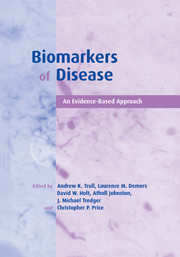Book contents
- Frontmatter
- Contents
- List of contributors
- Preface
- Part 1 Assessing and utilizing the diagnostic or prognostic power of biomarkers
- Part 2 Biomarkers of kidney disease and dysfunction
- Part 3 Biomarkers of bone disease and dysfunction
- Part 4 Biomarkers of liver disease and dysfunction
- Part 5 Biomarkers of gastrointestinal disease and dysfunction
- Part 6 Biomarkers in toxicology
- Part 7 Biomarkers of cardiovascular disease and dysfunction
- Part 8 Biomarkers of neurological disease and dysfunction
- Part 9 Biomarkers in transplantation
- 41 Monitoring heart and lung transplant patients
- 42 Monitoring liver transplant recipients
- 43 Chronic allograft damage index as a surrogate marker for chronic allograft rejection
- 44 Advances in pharmacodynamic biomarkers for monitoring the response to immunosuppressive drug therapy
- 45 The use of biomarkers for monitoring the response to immunosuppressive drug therapy
- 46 Post-transplantation bone disease
- 47 Molecular diagnosis of cytomegalovirus disease
- 48 Diagnosis and monitoring of inflammatory events in transplant recipients
- Index
47 - Molecular diagnosis of cytomegalovirus disease
Published online by Cambridge University Press: 20 August 2009
- Frontmatter
- Contents
- List of contributors
- Preface
- Part 1 Assessing and utilizing the diagnostic or prognostic power of biomarkers
- Part 2 Biomarkers of kidney disease and dysfunction
- Part 3 Biomarkers of bone disease and dysfunction
- Part 4 Biomarkers of liver disease and dysfunction
- Part 5 Biomarkers of gastrointestinal disease and dysfunction
- Part 6 Biomarkers in toxicology
- Part 7 Biomarkers of cardiovascular disease and dysfunction
- Part 8 Biomarkers of neurological disease and dysfunction
- Part 9 Biomarkers in transplantation
- 41 Monitoring heart and lung transplant patients
- 42 Monitoring liver transplant recipients
- 43 Chronic allograft damage index as a surrogate marker for chronic allograft rejection
- 44 Advances in pharmacodynamic biomarkers for monitoring the response to immunosuppressive drug therapy
- 45 The use of biomarkers for monitoring the response to immunosuppressive drug therapy
- 46 Post-transplantation bone disease
- 47 Molecular diagnosis of cytomegalovirus disease
- 48 Diagnosis and monitoring of inflammatory events in transplant recipients
- Index
Summary
Introduction
Cytomegalovirus (CMV) causes a variety of end-organ diseases in the immunocompromised host (see Table 47.1). CMV disease is diagnosed when patients meet an internationally agreed case definition [1], which essentially consists of symptoms of the affected organ and compatible clinical signs, plus detection of CMV in the affected organ (the only exception being the retina, where biopsy is not required). The pathogenesis of these conditions is distinct, probably involving contributions from the host as well as the virus. However, it is important to note that all of the CMV diseases have an underlying common pathogenetic factor – that is, CMV appears in the bloodstream before the onset of disease and rises to a high value to cause disease. It is this measurement of viral load that represents the biomarker being discussed in this chapter.
For more than two decades, a series of investigators defined several risk factors for CMV disease in different populations of patients (see Table 47.2). Thus, it is clear that primary infection represents a major risk factor in pregnant women and in recipients of solid organ transplants, whereas this is not the case in bone marrow transplant or acquired immune deficiency syndrome (AIDS) patients. Viraemia has been shown to be a risk factor in all the transplant patients and AIDS patients, but has not systematically been looked for in pregnancy.
- Type
- Chapter
- Information
- Biomarkers of DiseaseAn Evidence-Based Approach, pp. 467 - 473Publisher: Cambridge University PressPrint publication year: 2002



